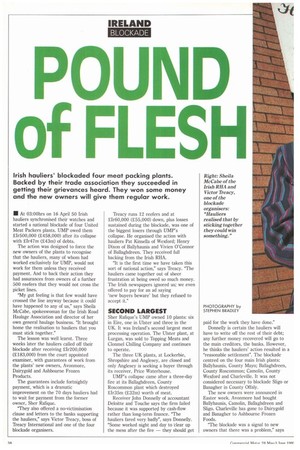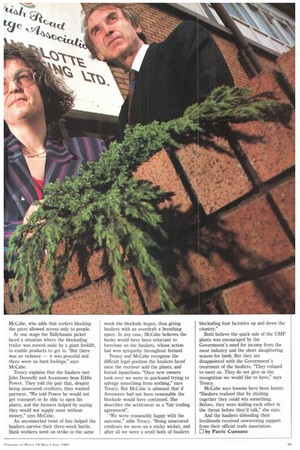POUND of FLESH
Page 40

Page 41

If you've noticed an error in this article please click here to report it so we can fix it.
Irish hauliers' blockaded four meat packing plants. Backed by their trade association they succeeded in getting their grievances heard. They won some money and the new owners will give them regular work.
• At 03:00hrs on 16 April 50 Irish hauliers synchronised their watches and started a national blockade of four United Meat Packers plants. UMP owed them £Ir500,000 (£458,000) after its collapse with ZIr47m (£43m) of debts.
The action was designed to force the new owners of the plants to recognise that the hauliers, many of whom had worked exclusively for UMP, would not work for them unless they received payment. And to back their action they had assurances from owners of a further 500 reefers that they would not cross the picket lines.
"My gut feeling is that few would have crossed the line anyway because it could have happened to any of us," says Sheila McCabe, spokeswoman for the Irish Road Haulage Association and director of her own general haulage business. "It brought home the realisation to hauliers that you must stick together."
The lesson was well learnt. Three weeks later the hauliers called off their blockade after receiving £Ir200,000 (£183,000) from the court appointed examiner, with guarantees of work from the plants' new owners, Avonrnore, Dairygold and Ashbourne Frozen Products.
The guarantees include fortnightly payment, which is a dramatic improvement on the 70 days hauliers had to wait for payment from the former owner, Sher Rafique.
"They also offered a no-victimisation clause and letters to the banks supporting the hauliers," says Victor Treacy, boss of Treacy International and one of the four blockade organisers. Treacy runs 12 reefers and at £1r60,000 (£55,000) down, plus losses sustained during the blockade, was one of the biggest losers through UMP's collapse, He organised the action with hauliers Pat Kinsella of Wexford; Henry Dixon of Ballyhaunis and Vivien O'Connor of Ballaghdreen. They received full backing from the Irish RHA.
"It is the first time we have taken this sort of national action," says Treacy. "The hauliers came together out of sheer frustration at being owed so much money. The Irish newspapers ignored us; we even offered to pay for an ad saying 'new buyers beware' but they refused to accept it,"
SECOND LARGEST
Sher Rafique's UMP owned 10 plants: six in Eire, one in Ulster and three in the UK. It was Ireland's second largest meat processing operation, The Ulster plant, at Lurgan, was sold to Topping Meats and Clonmel Chilling Company and continues to operate.
The three UK plants, at Lockerbie, Shropshire and Anglesey, are closed and only Anglesey is seeking a buyer through its receiver, Price Waterhouse.
UMP's collapse came after a three-day fire at its Ballaghdreen, County Roscommon plant which destroyed ZIr35m (£32m) worth of meat.
Receiver John Donnelly of accountant Deloitte and Touche says the firm failed because it was supported by cash-flow rather than long-term finance. "The hauliers fared very badly", says Donnelly. "Some worked night and day to Clear up the mess after the fire — they should get paid for the work they have done."
Donnelly is certain the hauliers will have to write off the rest of their debt; any further money recovered will go to the main creditors, the banks. However, he thinks the hauliers' action resulted in a "reasonable settlement". The blockade centred on the four main Irish plants: Ballyhaunis, County Mayo; Ballaghdreen, County Roscommon; Carnolin, County Wexford and Charleville. It was not considered neceRsary to blockade Sligo or Banagher in County Offaly.
The new owners were announced in Easter week_ Avonmore had bought Ballyhaunis, Camolin, Ballaghdreen and Sligo. Charleville has gone to Dairygold and Banagher to Ashbourne Frozen Foods.
"The blockade was a signal to new owners that there was a problem," says McCabe, who adds that reefers blocking the gates allowed access only to people.
At one stage the Ballyhaunis picket faced a situation where the blockading trailer was moved aside by a giant forklift, to enable products to get in. "But there was no violence — it was peaceful and there were no hard feelings," says McCabe.
Treacy explains that the hauliers met John Donnelly and Avonmore boss Eddie Power. They told the pair that, despite being unsecured creditors, they wanted payment. "We told Power he would not get transport or be able to open his plants, and the farmers helped by saying they would not supply meat without money," says McCabe.
An unconnected twist of fate helped the hauliers survive their three-week battle. Bank workers went on strike in the same week the blockade began, thus giving hauliers with an overdraft a breathing space. In any case, McCabe believes the banks would have been reluctant to foreclose on the hauliers, whose action had won sympathy throughout Ireland.
Treacy and McCabe recognise the difficult legal position the hauliers faced once the receiver sold the plants, and feared injunctions. "Once new owners took over we were in quicksand trying to salvage something from nothing," says Treacy. But McCabe is adamant that if Avonmore had not been reasonable the blockade would have continued. She describes the settlement as a "fair trading agreement".
"We were reasonably happy with the outcome," adds Treacy. "Being unsecured creditors we were on a sticky wicket, and after all we were a small body of hauliers blockading four factories up and down the country."
Both believe the quick sale of the UMP plants was encouraged by the Government's need for income from the meat industry and the short slaughtering season for lamb. But they are disappointed with the Government's treatment of the hauliers. "They refused to meet us. They do not give us the recognition we would like to have," says Treacy.
McCabe says lessons have been learnt: "Hauliers realised that by sticking together they could win something. Before, they were knifing each other in the throat before they'd talk," she says.
And the hauliers defending their livelihoods received unwavering support from their official trade association. []by Patric Cunnane




















































































